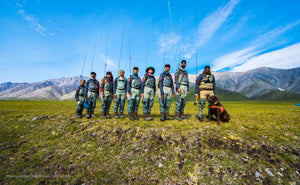Chad Brown of Soul River
We believe that doing good in the world is the right thing to do, regardless if it's good for business or not. We look to highlight, and contribute to those that are already in the fishing community and positively impacting people and planet.
We are delighted to launch with our first partnership with the team at Soul River.
~ Angler's Coffee
In the summer of 2020, Hatch magazine republished the essay “Thoughts on the Killing of George Floyd” by Chad Brown, a decorated US Navy veteran, a dedicated fly fisher, a Black American, and the founder and president of Soul River. The nonprofit fosters tomorrow’s environmental urban youth leaders with the help of today’s veterans and conservationists and, of course, with fly fishing.
If you hadn’t heard of Brown or Soul River before, you might have after that piece was published. He said on the podcast Anchored with April Vokey that he got a lot of hateful response to that essay. Though he was saddened by this, he was also unsurprised. After all, as he wrote, “I have been publicly accused of ‘taking’ fly fishing from white people…We all love the outdoors and, as Americans, nature is free for us to enjoy. But nature is not free for me the same way it is for white people.”
Yet it is the outdoors that Brown most associates with healing and community, two concepts of importance for both him and Soul River. He said in conversation with Oregon Wild that nature as “healing space is what has been a radical turn around for myself mentally and physically.” Nowhere does he feel this more than when he wades into the water, fly rod in hand, and often with other anglers and conservationists. Because at the end of the day, the fish are always just the extras.
Each time leaving the water under the setting sun, what Brown has filled up on is connection with his fellow humans, which creates relationships that turn into “a greater experience of anglers on the water,” he told Vokey. What’s important about fly fishing is much “deeper than what’s in my fly box.”
Fly fishing asks the fisher to be the joint between water and earth, connecting the two as the fisher casts both from deep within the water and rooted to the rocks beneath their boots. Even before his fishing days began, Brown stood between worlds. He grew up in Austin, Texas, but his childhood summers were spent on his grandparents’ farm outside the city. Every Sunday afternoon, his family gathered under the big tree in the pasture to watch his grandfather, father, and uncles wrestle bulls. Yes, Brown, a Black man in America, comes from a long line of Black cowboys.
Though he also comes from a military family, Brown did not envision himself serving. Expectations changed when he needed to earn money to continue his college education. He was sent to fourteen different countries and experienced two different wars. When his enlistment contract was up, he went home, the first time since he joined the Navy that he would live in the States for longer than three months.
As the story too often goes, everything seemed to be going great—until it wasn’t. Brown’s experiences in the Navy left him with post-traumatic stress disorder (PTSD). Veterans are not the only people who experience PTSD, but as a group, they face it at great cost. According to the US Department of Veterans Affairs, almost seventeen US veterans died by suicide each day in 2017.
Brown lost everything. This fast and hard downward spiral brought him, for the first time in this story, to the river. He drew his gun to kill himself. And passed out before he could fire a single shot. He was so heavily medicated with prescriptions from the VA that he could not stay awake to hurt himself.
Not long after that, going to the river saved him a second time. This time, for good. In the VA mental health ward, Brown met a woman who took him to the river where she’d found healing during a difficult time. Inspired by her story, Brown walked into the nearby sporting goods store and bought a rod. He tied the fly with a basic knot. He cast into the river. And he hooked a jack salmon. “I was hootin’ and hollerin’ all over the place,” he remembered. He suddenly became aware of the breeze on his face.
Brown realized he had “been a walking zombie for a very, very long time.” It was all luck—that he should meet that woman, that she should take him to that river, that they should put in near a fishing store, and that he should catch a fish on his first cast. But “that luck is what made me fell whole,” he said. That luck-turned-salmon was “what brought me into this new life.”
Brown returned to the VA, and his doctors literally wrote him a prescription to fish more. Brown was “all in” with fly fishing. It no longer mattered to him where he laid his head; he’d happily tie flies in his car. He started hanging out at the fishing shops and growing into a community. After years of putting in the hours on the water, including what he termed being “a roadie” for fishing guides, Brown had solidified his own strength, and it was time to give back. Soul River was about to be born.
Soul River aims to break down barriers on several levels. Under the mentorship of veterans, kids deemed at risk, many of whom also identify as BIPOC and/or LGBTQ+ and have different physical and mental abilities, “deploy” (as Brown calls it, “retooling” the military term) into wild places under threat. There, yes, they fish, but they also study with conservation groups, all with the goals of creating greater environmental justice and accessibility and becoming “outdoor leaders for tomorrow.”
Forty to sixty kids apply each summertime deployment season, and no one is turned away. Before each deployment, Soul River works with veterans and youth participants (along with the young people’s guardians) with a two-day orientation packed with clinics on everything from how to put on waders (and what waders are!) to how to communicate in a stressful situation. (Deployments happen in tight quarters, and in the natural world, as we all know, anything can happen.) Brown’s favorite icebreaker is one he devised: the vets wear blindfolds, and two or three kids buddied up to them must guide them in assembling a tent. By the end, Brown said, everyone is laughing.
Angler’s Coffee is joining the conservation groups, corporations, and government departments that support Soul River’s mission. Of this new support, Brown said, “I think it’s awesome.” The missions of Soul River and Angler’s “marry seamlessly” in so many ways, he explained. Not only are both founded in a love for fly fishing and the outdoors but they “understand how that nourishes us both.” The two organizations both strive to build community, give back, and bring a diversity of people into our wild spaces. Plus, Brown said, if there is one need he has that surpasses fly fishing, it might be coffee. “I drink coffee religiously,” he said, noting that it even helps him sleep at night.
You can support Soul River too. Soul River Inc.’s annual gala will be held at the Community Drive-In in Wilsonville, Oregon, on Sunday, November 1, 2020. It will be a socially distanced “drive-in” featuring a paddle raise auction, an exciting raffle, youth and veteran speakers, a catered dinner, and a special feature-length film. Individual tickets and sponsorship packages are available. If you’re interested in opportunities outside the gala, Soul River is always seeking volunteers in outdoor education and who have on-the-ground knowledge of the different places Soul River deploys to.


